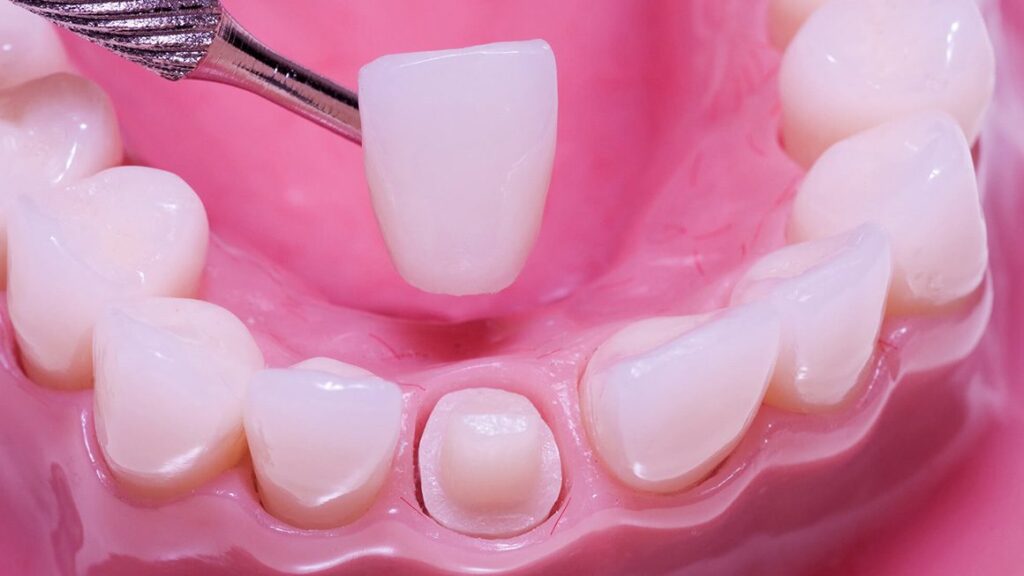Our Services
Our Contact Information
- Nisbetiye, Fecri Ebcioğlu Sk. No: 3E, Beşiktaş/İstanbul
- +90 544 152 34 34
- infodental@eb.clinic
- Monday / Saturday: 9:30 / 19:00
Zirconium Coatings

Durable and Aesthetic Dental Restorations
Zirconium crowns are a popular choice for dental restorations because of their strength, durability, and natural appearance. Made from zirconium, a type of ceramic, these crowns are used to cover and protect damaged or weakened teeth and provide both functional and aesthetic benefits.
What are Zirconium Crowns?
Zirconia crowns are dental caps made from zirconium, a high-quality, biocompatible ceramic material. Zirconia is known for its exceptional strength and ability to mimic the appearance of natural teeth. These crowns are typically used for both front and back teeth due to their durability and aesthetic qualities.
Benefits of Zirconium Crowns
- Durability: Zirconium is highly resistant to wear and fracture, making these crowns a long-lasting solution for restoring damaged teeth.
- Aesthetic Appeal: Zirconium crowns can be matched to the color of your natural teeth, creating a seamless and natural-looking result.
- Biocompatibility: Zirconia is gentle on the gums and does not cause allergic reactions, making it suitable for most patients.
- Strength: Zirconium crowns are sturdy and can withstand significant biting forces, making them ideal for restoring teeth in both the front and back of the mouth.
- Minimal Tooth Reduction: Zirconium crowns generally require less tooth reduction than metal crowns and preserve more of your natural tooth structure.
Zirconia Restorations
The high amount of material loss in teeth and supporting tissues increases the need to support teeth with restorations. At the same time, more aesthetic results can be achieved by using zirconia prostheses in teeth that are excessively colored and where restorations with high light transmittance such as porcelain laminates are not considered sufficient. Zirconia prostheses are preferred as a treatment alternative due to their lower durability and light transmittance.
What is Zirconia Restoration?
Durable, biocompatible and aesthetic dental restorations made with the use of a silvery white element called zirconium are called zirconia restorations. It is also preferred by people with allergies to metals such as nickel-titanium due to its better tissue compatibility and high fracture resistance. It enables successful restorations in tooth areas where high durability is desired and at the same time aesthetic results are expected.
When Are Zirconia Restorations Preferred?
Zirconia restorations can be applied in many dental treatments due to their high resistance and positive aesthetic properties. They are especially preferred to replace lost tissues in teeth that have lost most of their supporting tissues due to decay, trauma or previous restorations. Since they also show similar resistance properties in people with metal allergies, they provide successful and aesthetic results as an alternative. Zirconia restorations can be considered as an option with orthodontics or other restorations in people with gap dentition problems. They can be applied as a result of successful resistance in restorations of molar teeth. When there is advanced wear or discoloration on the teeth, they can be preferred to mask this situation and achieve aesthetic results. In cases where habits such as teeth clenching cannot be controlled, zirconium restorations can be used due to their resistant structure. Bridge restorations can be planned and zirconium restorations can be preferred in areas with tooth loss. They can be applied to increase the resistance of the teeth and protect the remaining tooth tissue after root canal treatments. Teeth can be arranged with zirconium restorations to solve some dental misalignments where orthodontic treatment cannot be applied. In cases where there is intense material loss in the tissues around the teeth, zirconium prostheses are applied to protect and support the remaining dental tissues. Zirconia restorations can also be selected to achieve an aesthetic result in implant-supported prostheses.
How Are Zirconia Restorations Applied?
In order to plan zirconia restorations, first of all, during the clinical examination, all personal characteristics such as current oral and dental health, the condition of the teeth and surrounding tissues, the evaluation of the face and smile, and jaw relationships are examined. As a result of the evaluations, clinical and digital plans are made by considering the aesthetic and functional expectations of the person. The outcome of the process can be predicted with the photographs and digital records taken. After all the evaluations and planning, the teeth are scraped to create space for the zirconia restorations and temporary aesthetic restorations are applied to protect the health of the teeth and gums and not to affect social life until the permanent restorations are produced. In the following session, the compatibility of the zirconia restorations with the tissues is tested and fixed to the teeth with special biocompatible and permanent bonding agents. Periodic control appointments are followed for maintenance.
How Are Zirconium Crowns Made and Placed?
- Initial Consultation:
- Your dentist will evaluate your dental health, discuss your treatment options, and determine if zirconium crowns are right for you.
- Preparation:
- The affected tooth is prepared by removing any decay or damaged tissue. The tooth is then shaped to accommodate the crown.
- Impression:
- An impression of your prepared tooth is taken to create a custom crown that fits perfectly. This can be done using traditional molds or digital scanning technology.
- Temporary Crown:
- A temporary crown can be placed while the permanent zirconium crown is being fabricated.
- Manufacturing:
- A zirconium crown is made in a dental laboratory based on an impression or digital scan of your tooth. This process usually takes several weeks.
- Placement:
- Once the crown is ready, your dentist will remove the temporary crown and place the permanent zirconium crown on your tooth, ensuring a proper fit and making any necessary adjustments.
- His control:
- Your dentist will check your bite and make sure the crown fits comfortably. The crown is then permanently cemented into place.
Frequently Asked Questions About Zirconium Crowns
- Are zirconium crowns as strong as metal crowns?
Yes, zirconium crowns are very strong and durable, often comparable to or even stronger than metal crowns. They are particularly valued for their ability to withstand significant biting forces while maintaining a natural appearance.
- How long do zirconium crowns last?
Zirconium crowns are known for their longevity and can last 10-15 years or more with proper care. Regular dental checkups and good oral hygiene practices will help ensure their durability.
- Do zirconium crowns look natural?
Absolutely. Zirconium crowns can be matched to the colour of your natural teeth, providing a seamless and aesthetically pleasing result. They are an excellent choice for both front and back teeth.
- Is the placement of zirconium crowns painful?
The procedure for placing zirconium crowns is generally comfortable, as local anesthesia is used to numb the area. Most patients experience minimal discomfort during and after the procedure.
- How should I care for zirconium crowns?
Caring for zirconium crowns is similar to caring for natural teeth. Maintain good oral hygiene by brushing twice a day, flossing daily, and visiting your dentist regularly for checkups and cleanings. To prevent damage, avoid biting on hard objects or using your teeth as tools.
- Can zirconium crowns be used for all types of dental restorations?
Zirconium crowns are versatile and can be used for a wide variety of dental restorations, including single-tooth restorations, bridges, and even implants. Your dentist will determine if zirconia crowns are the best option for your specific needs.
- Are there any risks or side effects associated with zirconium crowns?
Zirconium crowns are generally well tolerated and have a low risk of complications. However, as with any dental restoration, there is a small risk of problems such as crown loosening or sensitivity. Your dentist will monitor your crowns and address any concerns that arise.



